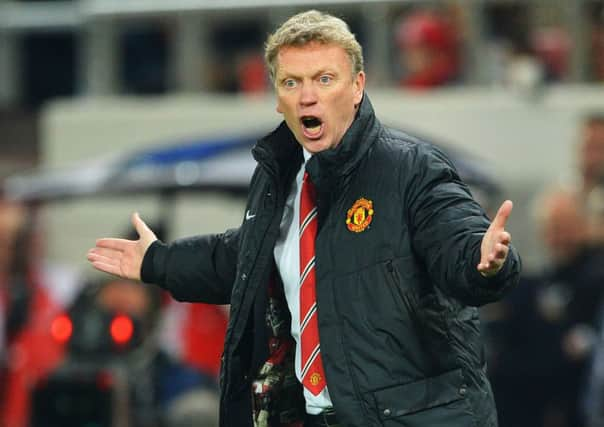Theatre of Dreams has turned into Moyes’ nightmare


The giants of English football have lurched to a new low with each passing month as the transition following Ferguson’s 26-year reign proves more difficult than the fans or owners could ever have envisaged. Under Ferguson, seasons were about chasing trophies. Now it’s about avoiding further embarrassment, with United out of both domestic cups and sixth in the Premier League, 11 points from the crucial cash-generating Champions League places.
Needing to lift the trophy in May to return to the Champions League next season, United’s tie with Olympiakos in the round of 16 seemed like a gift to Moyes from Uefa. But United were insipid in Greece on Tuesday, and bereft of any attacking threat or defensive cohesion in a dispiriting 2-0 loss.
Advertisement
Hide AdAdvertisement
Hide AdThirty years ago, pre-Ferguson, United overturned such a deficit against Barcelona to advance in the European Cup Winners’ Cup at Old Trafford, but such a feat would seem beyond this seemingly demoralised group of players, for whom the Theatre of Dreams has become the scene of too many nightmares this season.
“I take responsibility, it’s my team,” Moyes said after a tortuous night against Olympiakos.
The message from within Old Trafford remains that Moyes will be entrusted with leading the club’s revival.
How much is Moyes to blame for United’s misfortunes? The Scot was chosen to replace his compatriot partly because he was low maintenance and would not storm in wanting to rip up the squad. It was in an unusual moment of candour from within the United hierarchy, the day after the title was clinched with four games to spare last April, when this became apparent – just before Moyes was approached to replace Ferguson.
At that point, then-chief executive David Gill knew Ferguson would be retiring within weeks, despite the manager’s public denial days earlier. And, although Gill did not let slip Ferguson’s secret, what he said in an interview indicated that a change might not be too far away, and that the Glazer family didn’t want any drastic changes to the team.
Although United would go on to win a 13th Premier League title under Ferguson by 11 points, such success masked the necessity to strengthen an aging squad. “The quality of the squad, the composition of that squad, means that any new manager coming in will inherit a great squad of players,” Gill said on 23 April last year. “And yes he may, whenever that is ... clearly want to bring in one or two of his own people, new players. But he won’t want to change the squad wholesale because [then] he won’t be our manager. We’ve got to be consistent with that and that’s what we are planning on.”
The comments were eye-catching but set against Ferguson’s retirement denial. The succession plan, however, would be implemented rapidly, as Moyes was handed the job – initially secretly – to leave Everton and fill one of the toughest vacancies in football. Perhaps United did not fully recognise just how much the Ferguson factor contributed in pushing the team beyond their limits, although the club’s shareholders had been warned about the dangers of British football’s most successful and feared manager retiring one day.
“Any successor to our current manager may not be as successful as our current manager,” United said as it prepared to float on the New York Stock Exchange in 2012. “A downturn in the performance of our first team could adversely affect our ability to attract and retain coaches and players.”
Advertisement
Hide AdAdvertisement
Hide AdAs it proved in Moyes’ first transfer window. After the pursuit of Barcelona midfielder Cesc Fabregas failed, Marouane Fellaini was the only major summer signing and the recruit from Everton has made little impact during an injury-hit season.
The flaws in planning for the post-Ferguson era have become apparent in recent months. And from within the United boardroom a different message has emerged about this summer’s strategy, with vice-chairman Ed Woodward, who assumed Gill’s responsibilities, conceding the squad does in fact require a significant overhaul. Rather than building from a position of strength, as was possible last summer, the empire must fight back from one of weakness.
“We are not afraid of moving in the market in a way we haven’t seen in recent years,” Woodward said on a conference call with Wall Street insiders two weeks ago.
Juan Mata was persuaded to join from Chelsea last month in a club-record £31.7 million move. And Wayne Rooney was convinced to sign a new contract in the last week through to 2019, a powerful if expensive message to the world that the club can retain talent.
While not challenging for titles, United remain the commercial champions of English football, with the Glazer family building up a formidable marketing operation. The club expects to generate around £430 million in revenue this season, although such prosperity diminishes with an enduring downturn on the pitch. The fear is that the 20-time English champions morph into the next Liverpool, who are finally on the rise after a long spell in the wilderness, having won the last of their 18 top-flight titles back in 1990.
The club, though, won’t want to be living on past successes for too long, but it’s hard to see where the next trophy is coming from.
“United need six top-quality players,” said outspoken former captain Roy Keane, a TV pundit. “I would think David Moyes has been shocked. When he went into United in the summer he probably looked at the players and was expecting great things.
“Privately, he’s probably been shocked at the lack of quality that he’s working with.”